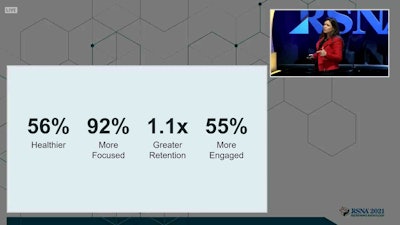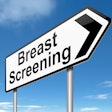
It costs nothing to be kind to colleagues in any workplace, including radiology. But the benefits of civility inspire new leaders while incivility leads to lost production and talent.
Those were just a couple talking points from the November 30 presentation of Christine Porath, PhD, at the RSNA annual meeting, where she showed data explaining how workplace behavior can affect other people and in turn, the workplace.
"I think who we want to be really changes everything, certainly patients' experiences and others' as well," said Porath, an associate professor at Georgetown University.
Porath presented data on how perception of civility in work environments affects employees and their overall performance. The trickiness, however, is what may be offensive and uncivil to one person may be fine for another, she said.
 Improving civility can help organizations such as radiology clinics improve work performance, creativity, and other aspects, according to a talk given by Christine Porath, PhD, at the RSNA annual meeting. In the pictured analysis, Porath led a study that found employees who felt respected were healthier, more focused, retained more information, and were more engaged with their work. Image courtesy of Christine Porath, PhD.
Improving civility can help organizations such as radiology clinics improve work performance, creativity, and other aspects, according to a talk given by Christine Porath, PhD, at the RSNA annual meeting. In the pictured analysis, Porath led a study that found employees who felt respected were healthier, more focused, retained more information, and were more engaged with their work. Image courtesy of Christine Porath, PhD.In one study, Porath and her team surveyed university alumni who worked at various levels in their respective industries. They asked them to recall one incident where they felt treated rudely, disrespectfully, or insensitively.
The team found that this one incident led to 66% of employees cutting back their efforts, 80% lost work time, and 12% left their job.
In another study, Porath and her team found that people who witness such incidents of incivility were three times less likely to help anyone. They also found that people who are surrounded by this behavior were five times less likely to retain information.
"What we were seeing is that people tend to become much more self-focused and much less other-focused when they're around this kind of behavior, which of course doesn't bode well for teams, collaborations, and patient safety," Porath said. "Incivility is like a virus. You can catch it at work, at home, online, or in communities."
However, civility is not just about simply not being rude to people. Porath said small behaviors such as greeting fellow employees in the hallway or listening to colleagues attentively promote civility. However, data also show that employees want recognition and respect from managers.
In one study Porath led, employees of a biotech firm were asked in a social network study how civil or uncivil people were. The researchers found that people who were viewed as civil were twice as likely to be viewed as leaders and perform better by 13%.
"People want to see respect and certainly, I think through the pandemic and so forth, were looking for even more empathy from leaders and others," Porath said.
In another analysis of company leaders and employee behavior, Porath and her team found that respect was the number one thing employees wanted from their leaders.
"In other words, respect was more important to people than things like recognition and appreciation, even opportunities for learning and growth," she said. "Those who felt they get respect from their leaders report being far healthier, they're much more focused, they're much more likely to stay in the organization, and they're far more engaged on a daily basis."
Porath said by being more respectful, radiology clinics can improve performance, creativity, and helpfulness. She said that people can improve themselves by homing in on their blind spots, working with coaching, and asking for constructive feedback.
The presentation was dedicated to Dr. O. Wayne Houser, former president of the RSNA, who passed away in 2020.




















